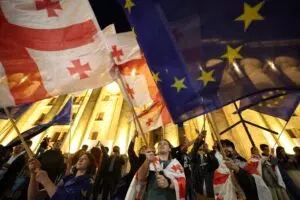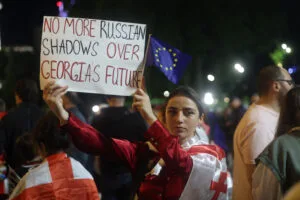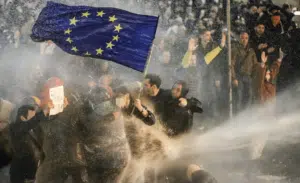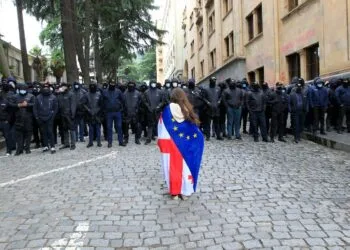Brussels -In Georgia, the inevitable is materializing, and the ball of institutional confrontation is picking up speed along the inclined plane of a pro-Russian-inspired law that is continuing to cause an irreparable rupture between the governing majority and civil society and with the European Union, which Georgia aspires to join. The Georgian Parliament is ready to override the veto by the President of the Republic, Salome Zourabichvili, on the law on ‘transparency of foreign influence‘ exacerbating the level of political tension in the country and likely putting the final stone (at least for the time being) on Tbilisi’s aspirations to move closer to EU and NATO membership.

“The Transparency Law will help us ensure long-term stability in Georgia, which is necessary for our country and our people,” Prime Minister Irakli Kobakhidze reportedly said during this morning’s (May 20) cabinet meeting, two days after the Head of State’s decision to oppose the draft law – strongly desired by the ruling Georgian Dream party – because “it is Russian in its essence and contradicts our Constitution.” After the bill passed in the third reading on May 14, the Presidential veto was seen more as a symbolic gesture than for its effectiveness: the government knew it could use its overwhelming majority in Parliament to override the veto and make the ‘transparency of foreign influence’ law, with the fourth – and final – vote expected to come as early as over the next few days.
The law on ‘transparency of foreign influence’ had been submitted last year by Georgian Dream and stalled after massive protests in March 2023. With a slight amendment to the text in early April, the law was resubmitted by the government: All organizations receiving more than 20 percent of their funding from abroad would have to register as an ‘organization pursuing the interests of a foreign power’ (similar to ‘agent of foreign influence’ in effect in Russia since December 1, 2022). After weeks of acute tension inside and outside the Tbilisi Parliament and tens of thousands of citizens staging the most massive wave of protests since independence from the Soviet Union in 1991 – every day continuously for almost two months now -the ruling party decided to go ahead with its own legislative initiative before returning to the polls on October 26, and showing a willingness to escalate the level of violence deployed by riot police and officers with their face covered against peaceful pro-EU protesters, alarming EU institutions in no small measure.

“Adoption of this law has a negative impact on Georgia’s progress on the path to EU membership,” the European Union warned in a statement issued the day after the adoption of the draft legislation, calling on authorities in Tbilisi and the ruling Georgian Dream party to “withdraw the law, maintain commitment to the EU path, and to pursue necessary reforms.” While the level of diplomatic tension between Tbilisi and Brussels is rising exponentially, the head of the European Council, Charles Michel, urged for calm and “a moment of further reflection” offered by President Zourabichvili‘s veto: “In its current form, the law is not in line with EU values and path,” he said, calling on “all Georgian politicians and leaders to make good use of this window of opportunity” so as not to deviate from the “European course the population supports.” Despite the Candidate country status received on December 14, 2023, from the European Council in Brussels, it is no longer a secret that the entry into force of the pro-Russian-inspired law would prevent the opening of EU accession negotiations since these are linked to progress on European Commission recommendations on civil society freedom and combating disinformation.
The heads of state and government of the 27 EU member countries are also showing increasing concern toward the fate of Georgia, as French President Emmanuel Macron and the German Chancellor Olaf Scholz said in a joint statement published yesterday (May 19): “It is with deep regret that we take note of the decision of the Georgian government and the ruling party to deviate from this path by acting against our common European values and the aspirations of the Georgian people.” Last Wednesday (May 15), the foreign ministers of Estonia, Latvia, Lithuania, and Iceland joined the protest of tens of thousands of pro-EU protesters in Tbilisi, explaining that they were “here to support the aspirations of the Georgian people to be part of the European Union and NATO,” Lithuanian foreign minister, Gabrielius Landsbergis said. “I see that hope is alive. It is in the streets and the hearts of all the people we met outside the Parliament.” It should not be forgotten, however, that the unity of the 27 member countries – and consequently of the Union – has been blocked by the resistance of Viktor Orbán’s Hungary and Robert Fico’s Slovakia to adopt a declaration by all 27 EU leaders to unequivocally condemn the law adopted by the Georgian Parliament.
The complex relationship between the EU and Georgia

Despite being granted candidate status for EU membership, the relationship between Brussels and Tbilisi remains particularly complex due to the divergence between an overwhelmingly pro-EU population and a government with pro-Russian tendencies, which applied to join the Union due to fears of the Kremlin’s expansionism. Over the past two years, there have been several episodes that have highlighted the ambiguity of the ruling Georgian Dream party: In May 2023, flights between Georgia and Russia resumed after Moscow decided to lift the current ban, and the Caucasian country never aligned with restrictive measures introduced by Brussels against the Kremlin after it invaded Ukraine. Last fall, the government also attempted to impeach (but failed) the President of the Republic Zourabichvili for a series of trips to the European Union that allegedly constituted a violation of the powers of the state head of state under the national Constitution.
But the Georgian population has for years shown that it does not share the direction taken by Georgian Dream, and this is why the elections for parliamentary renewal on October 26 will be crucial. Around the time of Brussels’ decision not to grant Georgia candidate status for the time being, in June 2022, two major pro-EU demonstrations took place in Tbilisi: March for Europe to reiterate the people’s alignment with the values of the Union and a public square call for the government to resign (with no follow-up by the then Garibashvili-led executive). The common features highlighted from these demonstrations are the flags-white and red of the five crosses (national) and with the twelve stars on a blue field (of the EU)- signs with pro-European claims and the Georgian anthem interspersed with the Ode to Joy. A year later, harsh mass protests broke out in March 2023 – backed by Brussels – which led to the temporary shelving of the controversial bill on ‘transparency of foreign influence,’ at least until the events of this spring.
In this scenario, one should not forget Georgia’s particularly sensitive relationship with Russia, a country with which it borders to the north. Its candidacy for EU and NATO membership – enshrined in its national constitution – has long been a cause of tension with the Kremlin. After conflicts in the 1990s with the two separatist regions of South Ossetia (1991-1992) and Abkhazia (1991-1993) following Georgia’s 1991 independence from the Soviet Union, on the ground, the situation was effectively frozen for 15 years, with troops of the newly formed Russian Federation defending the secessionists within the claimed territory. The attempt to reassert Tbilisi’s control over the two regions in the summer of 2008 – supported by then-President Mikheil Saakashvili -led to a violent Russian reaction on August 7, not only in repelling the Georgian army’s offensive but also leading to the invasion of the rest of the national territory with tanks and air raids for five days. Since then, Vladimir Putin’s Russia has recognized the independence of Abkhazia and South Ossetia and has deployed thousands of soldiers to the two territories to increase its sphere of influence in the Ciscaucasia region, in violation of the August 12, 2008 agreements.
English version by the Translation Service of Withub









